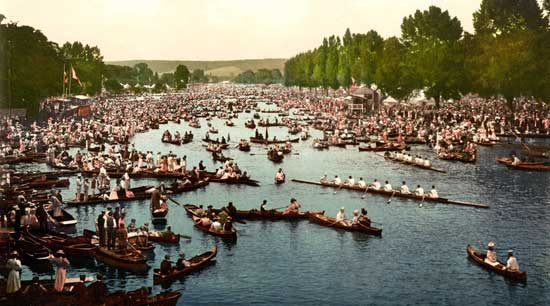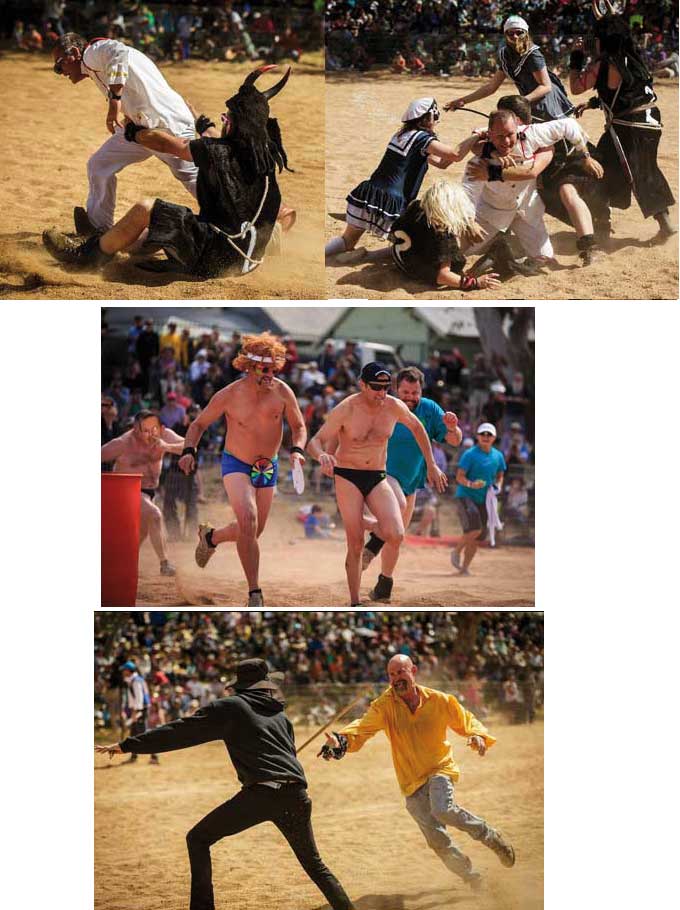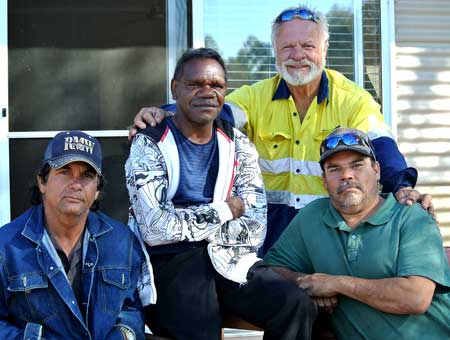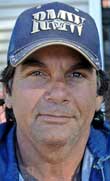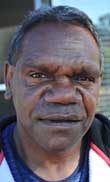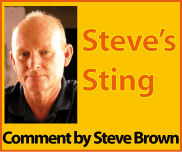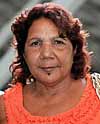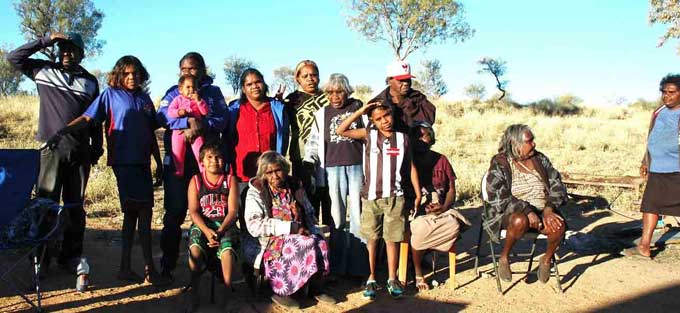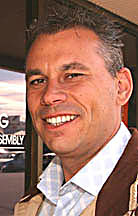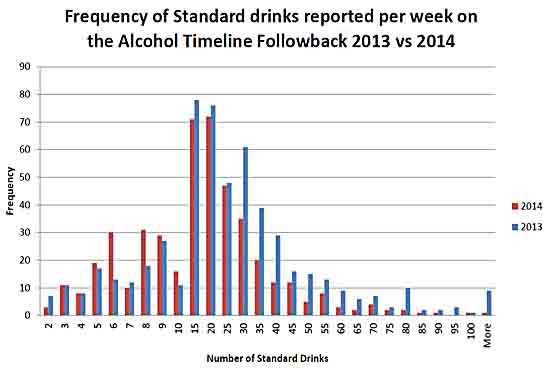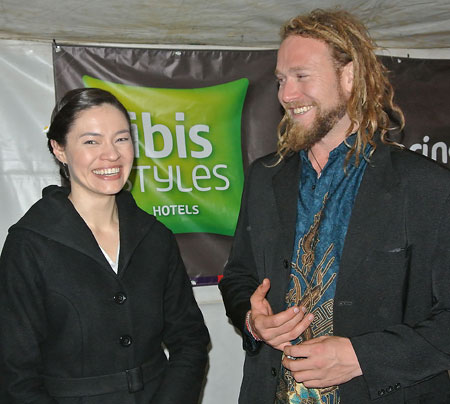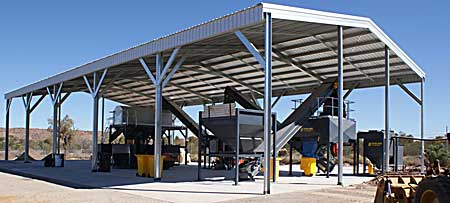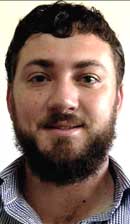![p2142-police-at-bottleshop-]()
PHOTOS, from top: Hope yet for the northern end of the mall? Cops checking take-away grog buyers • Tourism promotion of Rock doesn’t help Alice. • AFL match telecast, featuring the MacDonnell Ranges in the wide shots, was great advertising for Alice Springs. • Should our tourism pitch be drinking cocktails in a swimming pool – something tourists can do anywhere in the world?
![p2142-Daniel-Davis-1]() By ERWIN CHLANDA
By ERWIN CHLANDA
Full marks for law and order, but the tourism promotion focus needs to be shifted from the Rock to the Alice, and lots more work is needed on cranking up the economy.
On the second birthday of the Country Liberal Party government, that’s the view of Daniel Davis (pictured), vice-president of the CLP in the Territory (president Ross Connolly is Darwin-based).
He says his views are not necessarily those of the local branch, of which he is a past president. The Alice Springs branch pre-selects the candidates for Namatjira, Araluen, Greatorex and Braitling. It usually gets a say in Stuart but candidates for that seat are preselected by the Katherine and Barkly branches.
Mr Davis says law and order in the town has turned around with the decision by local police chief Jamie Chalker to post cops at bottle shops.
“Over in Gillen, where we live, the interruptions you used to get with people coming through, yelling and screaming, which is what you noticed the most, has declined significantly since the police have been at the bottle shop at the Flynn Drive supermarket,” he says.
“Although it is clearly mostly affecting a single racial group, it would not be fair to say that the legislation is racially motivated.
“I can imagine the pubs are not too happy with this, it has reportedly dropped their sales, but overall it has had quite a good impact on the town. I don’t see VB cans littering the length of the Todd River when I walk to work in the morning.”
He says a “significant number of shops” have closed in Todd Mall and Alice Plaza, but this is part of the national growth of online shopping.
However, “the rents in Todd Mall remained very high for some time.”
Mr Davis speaks from first-hand experience: he and his wife were running the tour booking agency, Adventure Net, in the mall for four years. When tourism slumped in in 2008 and 2009 they could no longer afford the rent. Mr Davis now works as the IT manager at the casino.
“Landlords seemed reluctant to adjust the rents based on what the market will bear. The prices have now dropped but look at the large number of vacancies in the mall. It will probably take some time to recover.
“In the southern mall there is a small number of people who own a significant percentage of the property, and they set the rates for a long time.
“Alice Plaza is the same. They charge huge amounts and don’t seem to be able to attract tenants for the money they are asking.
“That hasn’t helped businesses in the CBD and has contributed to numerous business moving out of the CBD into the industrial areas where rents are cheaper.
“In Todd Street North there is quite a bit happening around the cinema complex, while the rest of the mall seems pretty dead except for market days.”
![p2142-AFL-match]() NEWS: The NT Government gave the town council $5m to refurbish the northern mall.
NEWS: The NT Government gave the town council $5m to refurbish the northern mall.
DAVIS: I’m not yet convinced it was money well spent. The shopkeepers and the landlords also need to come on board. Why are we not seeing Alice Plaza shops open out into the mall?
NEWS: Should that have been a precondition for the $5m grant?
DAVIS: I think that should have been.
NEWS: Of course it was the previous government that gave the grant. But has the experience made this government gun shy when it comes to making a deal with the Town Council? Mr Giles is baulking at the request of putting a mere $2m into the $70m council and Uniting Church partnership for public space and apartments adjacent to Flynn Church?
DAVIS: We need to make use of our current commercial property first. At the moment though I don’t see the demand being there, especially in regards to commercial space. I would only support a council and Territory government cash input with a caveat that the public money be used for improvements in the public use spaces. I wouldn’t support government throwing $2m at a concrete tower.
NEWS: It is difficult to get access to politicians without going through PR minders. Are the government politicians accessible to the public?
DAVIS: On all sides of politics and in all tiers of government the PR minders essentially act as if their job is to get their masters re-elected. I have a problem with that, that’s the role of the party, not the public servants. Their job is to keep the public informed of the actions of government. Politicians should be accessible and open. You should not have to fight with some minder to get access to a politician. Obviously time constraints mean the politicians won’t be able to meet everyone’s requests for meetings but the minders’ job is to manage that fairly, not hinder access.
NEWS: What is the government’s role in stimulating the economy?
DAVIS: Where should the government start? It should not give handouts to prop up private enterprise to fill gaps in demand, that is not sustainable. We have seen this in the building industry, with SIHIP. Governments spent a huge amount of money, suddenly you have an influx of trades people. They buy a house in Alice Springs and stay on, but as soon as the government stops spending, a lot of people find it hard to get work. You need to build on it slowly, not dump a heap of money all at once. A lot of people in the construction industry are struggling to find work now but the government can’t continue to spend money for the sake of propping up the commercial construction industry. Especially whilst there is a glut of commercial premises currently available for rent in town.
NEWS: The conundrum in residential real estate – as Mayor Damien Ryan has previously explained – is that land prices went through the roof because of slow land releases. If now the government dumped cheap land on the market, this would rob people, who had bought at the height of the market, of the assets backing their mortgages. On the other hand, Councillor Steve Brown fears that failure to provide much cheaper land will accelerate the migration out of town and discourage families from settling here. He says if Alice became a ghost town, house prices, too, would be heading south.
DAVIS: We need to match release with demand so that the increase in home prices closely follows the cost price index, not follow trends in government spending in town. Land prices went through the roof not only because of slow release, but governments were spending big and people had money. Now it’s pretty difficult to reduce these prices. If you – say – released 100 blocks for $70,000 these would go quickly. The problem would not be fixed, you’d just have 100 people making a lot of money off the blocks when they resell them at market value. You’d have to keep releasing cheap land if you wanted to keep the price low. If you keep on releasing cheap land you’d upset everyone who’s got a mortgage, who’s, say, bought a block at Mt Johns for $300,000, and they’ve been sitting on it for three years and haven’t built anything. [With prices at $70,000] the bank’s going to be very reluctant to lend you money to build on your $300,000 block when you have negative equity in your asset.
NEWS: Should the government spend public money to promote the Ayers Rock Resort?
![p2142-tourism-promotion]() DAVIS: The NT has a healthy 7.6% share of the international visitors coming to Australia. They are long-stay visitors, not tourists just doing three or four nights in Australia. In Central Australia many do only Ayers Rock which, in the way it is set up, is to the detriment of the rest of the Territory. The direct flight option is bad for the rest of Central Australia. Only 50% of visitors to the Rock visit the rest of Central Australia. Promoting the Rock increases the number of international visitors to the NT but you’re robbing Peter to pay Paul. And Paul, the Ayers Rock Resort, doesn’t live here, he spends his money outside the NT. That’s a company from outside the NT. Ideally we would have direct flights to Alice Springs and a secondary flight to Ayers Rock. People want to go to the Rock, so these international visitors would be going there even if they had to go via Alice Springs. Yet they might spend an extra day here.
DAVIS: The NT has a healthy 7.6% share of the international visitors coming to Australia. They are long-stay visitors, not tourists just doing three or four nights in Australia. In Central Australia many do only Ayers Rock which, in the way it is set up, is to the detriment of the rest of the Territory. The direct flight option is bad for the rest of Central Australia. Only 50% of visitors to the Rock visit the rest of Central Australia. Promoting the Rock increases the number of international visitors to the NT but you’re robbing Peter to pay Paul. And Paul, the Ayers Rock Resort, doesn’t live here, he spends his money outside the NT. That’s a company from outside the NT. Ideally we would have direct flights to Alice Springs and a secondary flight to Ayers Rock. People want to go to the Rock, so these international visitors would be going there even if they had to go via Alice Springs. Yet they might spend an extra day here.
NEWS: But we’ve blown it. We sold the Rock. We don’t control the flights any more.
DAVIS: It’s a private airport. It’s up to them if they want it to be a national or a regional airport. It’s up to the company that owns the resort airport.
NEWS: But it’s up to the NT Government to promote or not promote the Rock. That could be reduced to zero.
DAVIS: I’m not necessarily a fan of promoting the Rock. There’s essentially only one operator at the Rock. If you are promoting the Rock you’re giving one company a handout amounting to however much the promotion costs. It wouldn’t have been such a problem if the government had sold the hotels individually, retaining competition. At least then you’re helping multiple operators. Territory operators would have had the opportunity of buying some of those. No private enterprise within the NT could have afforded to buy the entire resort. So it was sold off elsewhere.
NEWS: Germans, for example, get five to six weeks’ holidays. Why don’t more come here, and for a longer time?
DAVIS: The West Macs are not being promoted as well as they should be. That’s been the big problem. We’ve always promoted the major two – The Rock and Kakadu – and hoped this would have a flow on effect to the rest of the Territory. For the most part this just hasn’t happened. Look at the room costs at Ayers Rock and Darwin. You often can’t get a hotel room for less than $250 a night. Ayers Rock runs at extremely low occupancy rate, around 50%, with a high room rate. This means lower volume of tourists paying higher prices. Although that may be a good business model for the Rock this don’t encourage tourists to spend time in the NT when they are booking a holiday.
![p2142-tourist-promotion-1]() NEWS: Is Tourism NT’s promotional narrative the kind of thing that would get Herr and Frau Huber out of bed in Frankfurt, jumping on a plane and coming all the way to Alice? The ads seem to consist of a few happy snaps of pretty people at pretty locations, or sipping martinis in a pool, or riding camels with the Rock in the background. The context seems to be missing, that we have no pollution, fantastic weather, wide open spaces, light traffic, the most ancient living culture, a friendly outback town – all the things people in congested Europe, USA and the rich Asian countries are yearning for.
NEWS: Is Tourism NT’s promotional narrative the kind of thing that would get Herr and Frau Huber out of bed in Frankfurt, jumping on a plane and coming all the way to Alice? The ads seem to consist of a few happy snaps of pretty people at pretty locations, or sipping martinis in a pool, or riding camels with the Rock in the background. The context seems to be missing, that we have no pollution, fantastic weather, wide open spaces, light traffic, the most ancient living culture, a friendly outback town – all the things people in congested Europe, USA and the rich Asian countries are yearning for.
DAVIS: We’ve had some very bad publicity which has put off a lot of tourists. Travel agencies recommend to just go to Ayers Rock because they think Alice Springs is pretty bad. We’ve got to get around that. The numbers have stopped declining and stabilised which is positive. We have to start with the national market. We have only around 2.6% of that. Our share of the international market is almost triple that.
NEWS: What do we tell the national market?
DAVIS: We need to make the place accessible without a four wheel drive – or make it clear that you don’t need one to see half of the MacDonnells, as well as Ayers Rock an King’s Canyon. And tell them that there are places in the Territory that are reasonably priced. Don’t just look at the Rock where you pay $40 for an unpowered camping site.
NEWS: What does spending money on footy matches do for the industry?
DAVIS: The sports promotion is aiming at the national market. The Melbourne Demons have reasonably affluent supporters. But to target a small number of people is not going to be very effective in the long run. They might come once every 10 years. The Do the NT logo at the back of a press conference box is not going to bring people here. However, the AFL game at Traeger Park, televised nation-wide on a Saturday afternoon, with the MacDonnell ranges in the background, that was the best advertising I’ve seen for Alice Springs for a long time.
NEWS: Nothing substantial has happened for a long time to enhance visitor facilities in the MacDonnells.
DAVIS: The Mereenie loop road needs to be sealed. That’s the number one thing. That will add the West Macs to the King’s Canyon and Rock experience for many people.
NEWS: It’s common belief that the Central Land Council’s blocking access to a quarry is making the cost of sealing the Mereenie loop prohibitive. Is there a case for the government talking to the Aboriginal land trust direct? After all, they are the organ grinder and the CLC is the monkey.
DAVIS: I can’t imagine that the traditional owners living there would have any objection to the road being sealed. We keep hearing that communities want better roads, the people at Santa Teresa have been screaming for their road to be sealed for a long time. Sealing the loop means the traditional owners will have a road which will be much safer. Over the years a number of people have died on the Mereenie loop road and there have been many serious accidents from the condition of the road. It will also offer local Aboriginal communities opportunities for trading with tourists.
NEWS: Could the government, for example, develop headworks in some locations in the MacDonnell national parks, east and west, put in roads, water, power, sewerage, phone, and invite private developers to build wilderness lodges there, or pubs?
DAVIS: Is there a market for that? If so, is it significant? You’d need to get visitors travelling there first. Getting better access to all the beauty spots would be an earlier priority. Many places need 4WD at the moment, in most cases the dirt sections are only a few kilometres. It’s not much road to improve but it’s been neglected for a long time.
NEWS: Is the tourism industry recovering or just stabilising after a sharp decline?
DAVIS: The market we can expand is the national market and that’s now mostly self-drive. Trouble is, people now base themselves at roadside stops and do day trips, and often don’t spend money in towns aside from food and petrol. We’ve seen visitation numbers now stabilising last year after they had been constantly dropping for some years. Some operators are now seeing a 15% increase in occupancy rates on the previous year which hasn’t happened in a long while. The government is now advertising the whole of the NT with the “Do the NT” ads, and not just the Rock and Kakadu. As you know, people could spend a week here and wouldn’t have seen the half of it. I think the outlook for the tourism industry as a whole though is positive.
NEWS: We’ve had a very detailed account, supplied by the government, of Alice Springs’ water reserves at current extraction rates. It is 300 years. However, if we are looking at an expansion of the town, or to start horticulture and agriculture, we have no guide as to how much water would be available other than cutting into the 300 year reserve. Just this week the Department of Land Resource Management told us it has a budget of $9.6m for water exploration across the NT for the next four years. “We are currently working with the Department of Primary Industry and Fisheries to identify areas with the best potential for development. So in other words we are currently in the planning stages,” we were told by a spokesman. This seems to be an amazing omission by the decade of Labor governments and a slow catch-up by the CLP.
DAVIS: If there is a lot of interest in agriculture and the reserves drop to, say, less than 100 years then we need to look at the options. If we can’t find more we may have to build a pipeline from Darwin or from other catchments in the north. A lot of people here are doing pretty well growing food. Most of the town’s lettuce is grown here, there’s a market garden in Heffernan Road, it’s obviously a viable industry. I think it’s important to gauge the interest in agriculture first. If we have 300 years’ supply at current consumption the government has time to gauge interest in primary production.
Mr Davis says the increase of Kilgariff blocks from 30 to 80 “is a good thing,” giving construction companies the opportunity of spec building on five blocks spread over times when other work dries up.
NEWS: Should we draw people into town with cheap land?
DAVIS: I’m not sure cheap small blocks are necessarily the answer. If you want to expand you expand from the centre outwards. There is plenty of land. When Kilgariff was started there were already two private subdivisions under construction, Ron Sterry’s Coolibah Estate and John McEwen’s Emily Valley Estate [adjoining Mr Sterry's land to the east]. The government was saying to them, if you want sewerage, water and headworks you have to pay for it. And then the government put all that out to Kilgariff and is building Kilgariff. Why did they make it hard for the two private developers? The government could have helped them to keep down the cost of blocks.
NEWS: The Alice has been stagnant for a decade. Should we blame construction costs?
DAVIS: The cost of construction here, for some reason, can be double the cost of interstate. Two and a half thousand dollars a square metre is pretty expensive for just a residential building. The cost of road building here is huge, which is holding back a lot of development of our roads. For example, I’ve heard the cost of sealing the NT side of the Plenty Highway [part of the east-west Outback Highway] is two and a half times of what it costs to seal the Queensland side. There are not many companies here with the capability to supply asphalt for significant sealed road construction leaving us stuck with a virtual monopoly. So they can say, this is our price, take it or leave it. In Sydney you’d have 10 different companies tendering for the work. There could be a case for these sorts of services to be done by the shires or government. Governments used to do much of that work themselves – maybe bring back a Department of Works type of situation where there is insufficient competition to keep prices low.
NEWS: It seems the government’s do-it-yourself Kilgariff may be just the way to go.
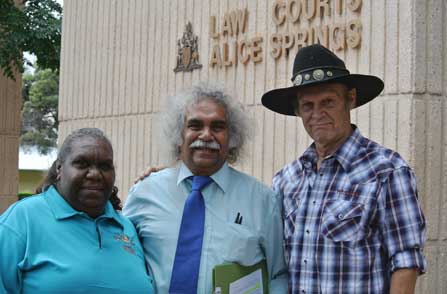

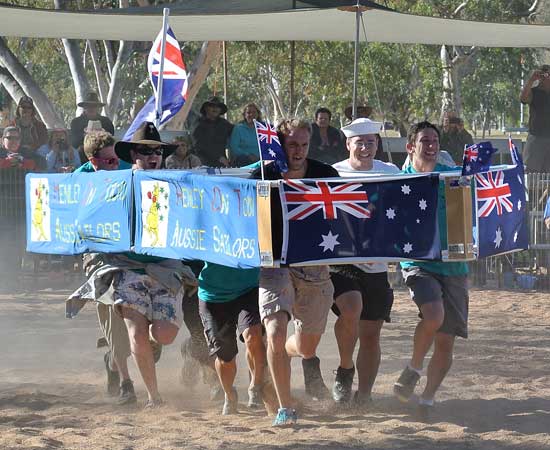

 Desert Race and countless smaller initiatives, the HoT is a spectacular example of the town’s community spirit and can-do attitude.
Desert Race and countless smaller initiatives, the HoT is a spectacular example of the town’s community spirit and can-do attitude.
